SE CASC Fall/Winter 2022 Science Seminars
Join us this Fall & Winter for a virtual science seminar series highlighting SE CASC funded projects supporting resource management actions across the Southeast. SE CASC researchers will provide an overview of their work and the management implications of their research findings. Explore our collection of Science Seminar Series recordings here.
Facilitating Accurate and Effective Application of Coastal Marsh Models
Renee Collini (PLACE:SLR), Trevor Meckley (National Centers for Coastal Ocean Science (NCCOS)), Christine Buckel (National Centers for Coastal Ocean Science (NCCOS))
January 12, 2023 | 11AM ET
View a recording of the webinar
Webinar Overview:
Salt marshes are integral to coastal communities, providing habitat for important species, such as shrimp and fish, and reducing the frequency and intensity of flood impacts on our homes and businesses. As sea levels continue to rise it is important that we understand how the health and extent of these marshes is expected to change so we know what actions we can take to maintain their critical function. There are many models that have been developed to characterize how marshes may respond to rising seas, each with a different approach and focus. As with any emerging scientific field, it is important to assess if the models’ predictions reflect what we observe; however, only recently have we had the ability to do that with marsh models because we lacked the detailed observations that were required.
We convened the leading marsh modelers from around the U.S. to devise a scientifically robust method for conducting a retrospective analysis. A retrospective analysis is where all the models are run with the same input information and from the same starting year from the past and the outputs are analyzed to see if they reflect what marshes look like today. It took a whole workshop and a team of modelers to devise an approach because each model is different, with different requirements for what needs to be put into the model and how the model produces its results. With this workshop we were able to devise a plan that worked for all the models and build buy-in to the processes among the modeling community. With this plan in place we are now able to perform the essential step of conducting the retrospective analysis so that we can understand which models work best in which coastal systems and for answering which management questions.
More About the Speakers:
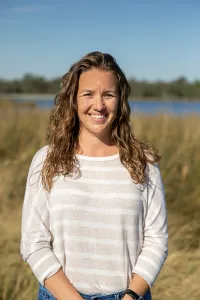
Renee Collini (PLACE Program Coordinator): Renee has a dual appointment as a Coastal Climate Resilience Specialist with Mississippi State University and Sea Grant. Focused on sea-level rise, Renee facilitates the flow of information between researchers and decision-makers to improve science application. The lead of the Program for Local Adaptation to Climate Effects: Sea-Level Rise, she integrates a multi-state network of stakeholders, researchers, NGOs, and state and federal agencies to build tools, programs, and projects to address gaps in sea-level rise observing, research, and decision-making in the northern Gulf of Mexico. She has collaborated on projects and efforts that have improved coastal community and environmental resilience and has led development of tools that have been applied throughout the Gulf and across the United States. Collini is a recognized leader in resilience across the Gulf of Mexico and is serving as an author on the Fifth National Climate Assessment Coastal Effects Chapter.
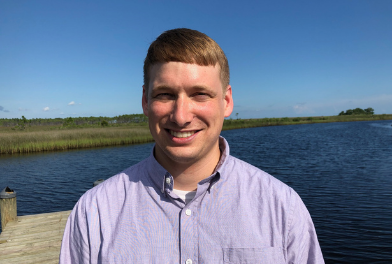
Trevor Meckley (Oceanographer/Program Manager): Meckley manages the Effects of Sea Level Rise (ESLR) Competitive Research Program. The ESLR program provides a suite of science products to inform coastal managers of local coastal vulnerability and solutions that mitigate flood risk to ecosystems and communities; he also supports scientific and management activities regarding hypoxia in the Gulf of Mexico.
An ecologist by training, Meckley received his B.S. from Millersville University, and both his M.S. and Ph.D. from Michigan State University while studying the invasive sea lamprey migration in the Great Lakes. These studies involved the use of mathematical and statistical techniques to develop mechanistic models of organism movement that answer applied questions on invasive species control. This foundation guides Meckley’s management of applied research programs that often support the advancement of modeling methods to identify solutions to mitigate coastal flooding and nutrient pollution issues.

Christine Buckel (Ecologist, Geospatial Analyst and Data Visualization): Buckel works on resilience centered projects that span a variety of topic areas from corals, to marshes, to storm surge under sea level rise. She manages data of all types, analyzes their spatial and temporal patterns, and then develops data visualization products to help clients understand trends and patterns in an accessible way.
Early in her career with NCCOS, Addison-Buckel traveled throughout the Caribbean and the U.S. East coast diving to record coral and reef fish community data and analyze their trends. Currently, she spends less time in the field and more time behind a computer and in conference rooms analyzing and discussing sea level rise data with stakeholders.
Addison-Buckel received her BS in Biology and then later went on to the University of California, Santa Barbara for her MS in Marine Science.
Southeast Regional Invasive Species and Climate Change Management Network
Dr. Brett Scheffers (University of Florida), Dr. Deah Lieurance (University of Florida), and Dr. Wesley Daniel (USGS)
December 13, 2022 | 10AM ET
View a recording of the webinar
Webinar Overview:
Ecosystems in the US are being transformed by two large-scale interacting threats: invasive species and climate change. Recently, regional networks of invasive species managers, state- federal- and tribal agency representatives, and research scientists have formed to tackle the challenges posed by the intersection of invasive species and climate change. These Regional Invasive Species and Climate Change (RISCC) management networks aim to reduce the joint effects of climate change and invasive species by synthesizing relevant science, sharing the needs and knowledge of managers, building stronger scientist-manager communities, and conducting priority research. The Southeast RISCC was established earlier this year and joins a national network of RISCC networks in the Pacific Islands, Northwest, Northcentral, and Northeast. The Southeast is particularly important because many potential invasions are currently suppressed by cooler climates and as the climate warms, the Southeast may serve as a possible source of invasion towards other RISCC regions. Additionally, the Southeast is prone to many extreme weather events that may also facilitate biological invasions.
In this webinar, we will detail the creation of the Southeast RISCC, highlight some results from our managers and researchers’ surveys, and discuss our integration with the other RISCC networks.
More About the Speakers:
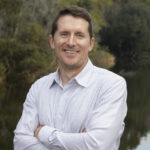
Dr. Brett Scheffers is a global change ecologist with interests in drivers of biological organization in space and time and the effects of human disturbance on these processes. Scheffers joined the University of Florida in 2015 and is a member of the Wildlife Ecology and Conservation Department (WEC). His research encompasses the broad topic of global change biology to include how climate change, habitat loss, and the trade of wildlife impacts communities of plants and animals.
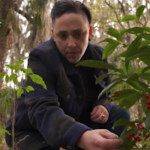
Dr. Deah Lieurance is an Extension Scientist in the Agronomy Department at the University of Florida (UF). She has been the coordinator of the UF/IFAS Assessment of Non-Native Plants in Florida’s Natural Areas since 2013. She received her Ph.D. from Wright State University, Dayton Ohio in 2012 and prior to that spent 3 years in Ft. Lauderdale working on the development of biocontrol agents at the United States Department of Agriculture (USDA) Invasive Plant Research Laboratory.
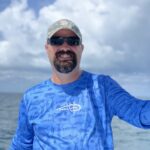
Dr. Wesley M. Daniel is a supervisory fisheries biologist with the U.S. Geological Survey at the Wetland and Aquatic Research Center in Gainesville, FL. He is the coordinator for the Non-indigenous Aquatic Species (NAS) Database and supervises a team of eight scientists. Wes is an aquatic landscape ecologist, and his research focuses on identifying and modeling the impacts and introduction pathways of invasive species.
Improving Projections of Societal Responses to Sea Level Rise and Frequent Flooding
Dr. Georgina Sanchez, North Carolina State University
Nov. 10, 2022 | 11AM ET
View a recording of the webinar
Webinar Overview:
Projecting human migration and shifts in development patterns in response to future flood hazards is crucial for anticipating the need for policies and/or investments that protect lives, infrastructure, and natural resources (e.g., development restrictions, buyout eligibility, nature-based solutions for flood protection). Land change science has long helped decision-makers better understand the implications of development and conservation choices and evaluate the tradeoffs between competing socio-environmental needs. In this talk, we will highlight a framework that permits simultaneously considering scenarios of urban growth, increases in flood hazard due to climate change, and human adaptive response (based on socio-economic vulnerability or ability to cope with flood damage). Specifically, we will focus on scenario-based approaches that allow exploring plausible adaptation strategies (i.e., elevating homes, moving homes, coastal armoring) and consider local adaptive capacity and the non-economic factors that influence a choice.
More about the Speaker:
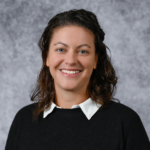
Georgina Sanchez, Ph.D. is a Research Associate with the Center for Geospatial Analytics at NC State University. Her interdisciplinary approach to research bridges land and climate change science, hydrology, and geospatial analytics to address sustainability challenges. Georgina holds a Ph.D. in Forestry and Environmental Resources from NC State University and an M.S in Biosystems Engineering from Michigan State University.
